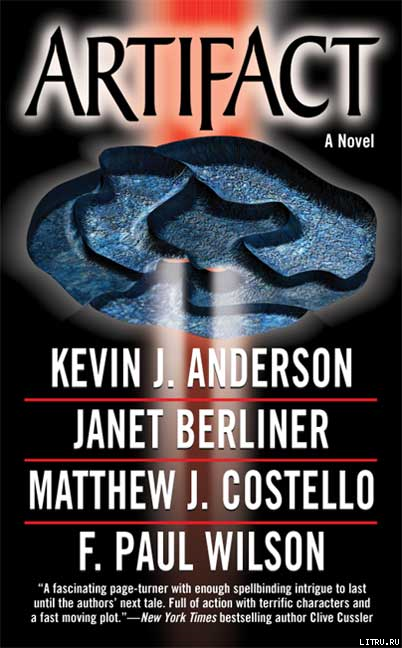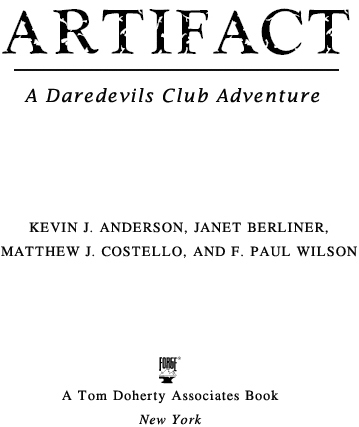
Books by Kevin J. Anderson
Dune: The Butlerian Jihad (with Brian Herbert)
Ignition (with Doug Beason)
Books by F. Paul Wilson
The Haunted Air
Conspiracies
Legacies
The Tomb
Deep as the Marrow
Implant
Available from Tom Doherty Associates

This is a work of fiction. All the characters and events portrayed in this novel are either fictitious or used fictitiously.
ARTIFACT: A DAREDEVILS CLUB ADVENTURE
Copyright © 2003 by Janet Berliner, Matthew J. Costello, F. Paul Wilson, and Wordfire, Inc.
All rights reserved, including the right to reproduce this book, or portions thereof, in any form.
Edited by James Frenkel
A Forge Book
Published by Tom Doherty Associates, LLC
175 Fifth Avenue
New York, NY 10010
Forge® is a registered trademark of Tom Doherty Associates, LLC.
ISBN: 0-312-71006-2
First Edition: May 2003
Contents
Acknowledgments
Prologue
1
2
3
4
5
6
7
8
9
10
11
12
13
14
15
16
17
18
19
20
21
22
23
24
25
26
27
28
29
30
31
32
33
34
35
36
37
38
39
40
41
42
43
Epilogue
About the Authors
Acknowledgments
The authors wish to thank Robert L. Fleck, without whose hard work and dedication this book never could have been completed. Also Laurie Harper, an excellent agent and friend. And finally Jim Frenkel and the staff at Forge Books for making the editorial process smooth and enjoyable.
Additionally, thanks are due to our Grenadian friends Moses Findley, George Grant, and Winston, as well as Rebecca Moesta and Catherine Sidor.
Prologue
GRENADA, DECEMBER31, 1982
Show time!
Peta Whyte struck a Bob Fosse dance pose in front of the brooding edifice that was Richmond Hill Prison. Despite the tension of the moment, she smiled at the strange juxtaposition. The two-hundred-yearold fortress, with its view of Grenada’s harbor and the crystal blue Caribbean, was a perfect symbol of the harsh reality that now controlled her island, an island that had long been considered the jewel of the West Indies.
The U-shaped harbor and surroundings looked like a miniature Monte Carlo. A rainbow of brightly colored tin-and-wooden houses, small hotels, and provision stores which stocked little more than the necessities of life—rum, rice, cigarettes, and beer—meandered from the top of several hills down to the business and restaurant district which fringed the water. Fort George, like Monte Carlo’s famed Castle-Fort, crested the top of the right-hand hill. Below it, hidden from view on the far side of the hill, lay the central marketplace. Looming over that, at the top of Church Street, stood a cathedral whose bells pealed melodically and often. At the top of the opposite hill, replacing Monte Carlo’s casinos, was a gun emplacement which surrounded and essentially hid the island’s only radio station from view.
From where she was standing, Peta could hear her Rasta friend Jimmy and his buddies playing soca on the steel drums that lined the fringes of Tanteen Park, which lay directly below her. In her mind’s eye she could see the familiar scene at the bottom of the hill. Across the street from Jimmy, in front of the entrance gates to the docks, a series of booths sold food, smokes, and fireworks. Outside the neighboring fishery, old ladies, unmindful of the country’s unrest, were sitting at open grills, cooking corn and jacks, the long silvery fish so abundant in the waters around the island. The jacks looked like overgrown sardines and, even grilled to a crisp and eaten bones and all, tasted like kippers.
Between the bountiful waters and the fruit and vegetables available all year just for the plucking, the only reason anyone went hungry on the island was out of sheer laziness, Peta thought, wishing that she could be among the vendors and musicians, acting like a carefree teen instead of someone with murder on her mind.
Only, if she were, her mentor and friend, Arthur Marryshow, would be as good as dead, and it would be as much her fault as it would be the Communists’ who had imprisoned him.
Obedient to her instructions, Jimmy continued to play. His beat wafted up the slope on Grenada’s sunset trade winds, heralding the end of the old year and the start of the new. Any excuse was good enough for a party. And why not? Tomorrow would be time enough to return to politics; tomorrow, when everyone had slept off the rum and the beer and the ganja. She had told Jimmy to keep playing loudly for at least an hour or until she returned, whichever came first.
It occurred to her now that he would have played on anyway, and that a more intelligent instruction might have included telling him what to do if she didn’t come back, like calling her next of kin.
Such thinking was, she knew, counterproductive. She stopped herself and glanced up at the small window of the cell where Arthur was being held in solitary. His crime: suspected espionage against Grenada’s Cuban-backed New Jewel government. If her friend and mentor was watching, her pose would send him a message, a reminder of their trip to New York three years ago. The trip had been her thirteenth birthday present—and his thirty-first.
Peta had been a precocious thirteen. Her mother had been working several jobs since her father’s untimely death four years earlier, so Peta was left to take care of her younger siblings. Saved from feeling sorry for herself by natural intelligence and a streak of innate pragmatism, she’d managed to be practical, popular, and a good student.
All of which Arthur rewarded in as many ways as he could, including the trip to New York. They’d seenAll That Jazz, and declared the movie’s risk-taking protagonist to be their hero. Later, they’d eaten dinner at a place called Danny’s Seafood Grotto, and vowed to return there every year. On New Year’s Eve.
A good plan, Peta thought. Except that someone should have told the Cubans not to interfere with Grenada and told the New Jewel Movement to disband. Instead, a hunger for power and for the blood of the enemy, whoever that might be, had turned her island into a madhouse.
This was a small island. Half the people were related, and the rest knew each other’s business. Which was how she knew that William, her cousin’s husband, would be on guard duty outside the prison tonight.
She rubbed her shoulder, bruised from the heavy backpack she’d lugged up Richmond Hill for William and his partner. William was a militant, sadistic bastard who for the last few years had hit on her at every opportunity. He’d be happy to see her, and easy to convince that the real reason she’d trekked up St. George’s highest hill to spend New Year’s Eve at the island’s only prison was that he was, finally, irresistible.